The NBS Head Office Building was built from 1888 – 1890, on the basis of blueprints designed by Konstantin Jovanovic (Vienna 1849 – Zurich 1923), son to distinguished artist Anastas Jovanovic...
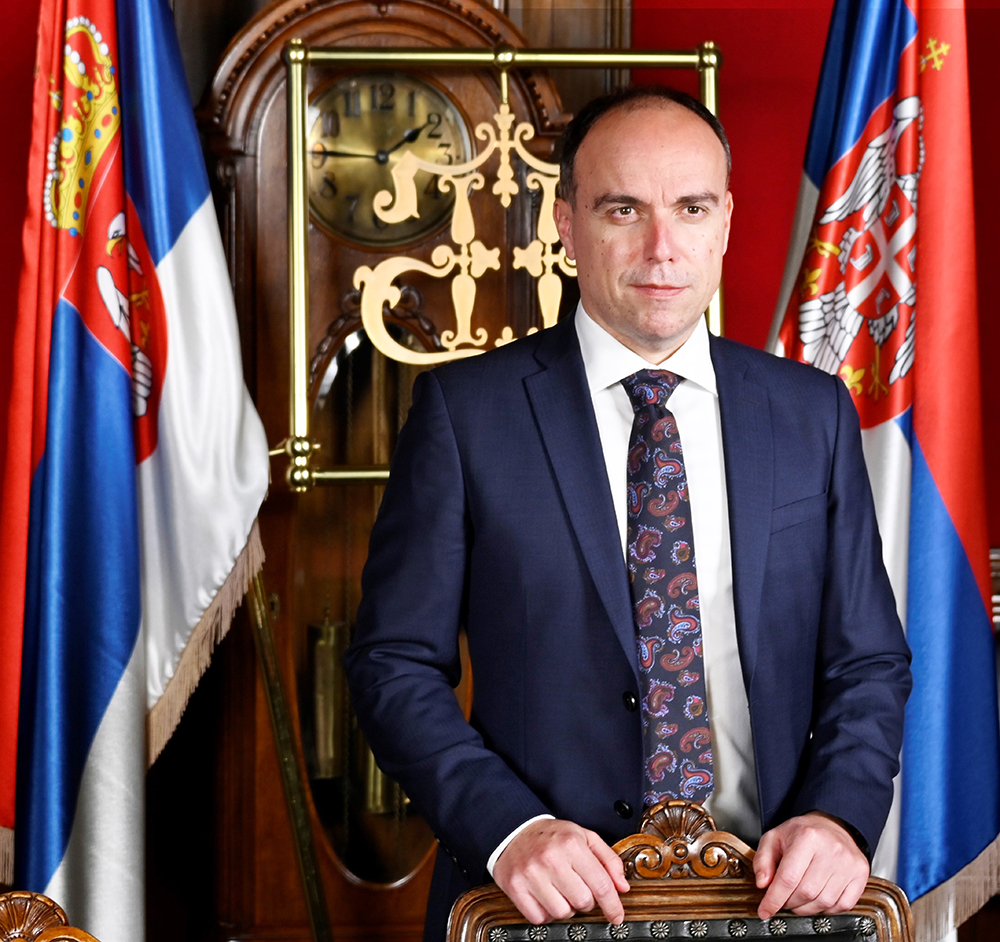
Fourth term in office – from 19 March 2025
Third term in office, 5 years – from 14 February 2019 to 14 February 2024
Second term in office, 5 years – from 16 December 2013 to 16 December 2018
First term in office, 1 year – from 13 November 2012 to 13 November 2013
Ivan Nikolić was born on 13 June 1975 in Belgrade, where he finished primary and secondary school with an excellent grade point average. In 2001 he graduated from the Faculty of Economics, University of Belgrade, at the Department of General Economics. There he also obtained the title of a Master of Economic Sciences by defending his Master’s thesis, titled “Analysis and Projection of the Real and External Sectors” under the mentorship of Prof. Dr Biljana Jovanović Gavrilović. On 16 January 2014 he defended his PhD thesis titled “The Effects of Privatisation on the Performance of Industrial Companies in Serbia” at the Faculty of Economics, obtaining the title of a Doctor of Economic Sciences.
Since March 2024 he has worked at the Institute of Social Sciences as a senior research assistant and headed the Centre for Economic Research.
Mr Nikolić began his professional career in 2002 as a junior research assistant at the Institute of Economic Sciences in Belgrade.
Between March 2004 and March 2024 he worked at the Economics Institute a.d. – Centre for Economic Research, first as a research assistant, and as of 8 August 2014 as a Director for Scientific and Research Development, which means he was also a member of the Managing Board, i.e. President of the Scientific Council of the Economics Institute a.d. Belgrade.
Since 2003 he is a standing coauthor, and since 2017 an editor of the bulletin “Macroeconomic Analyses and Trends and the Economic Barometer – MAT,” a unique monthly publication in the field of macroeconomic research that analyses current economic trends and the effects of macroeconomic policy measures, and provides short-term projections of key economic aggregates and indicators. MAT has significant influence not only on domestic economic policymakers but also on the general public.
In 2001, he completed the course Financial Programming and Policy at the IMF Institute and undertook professional training in the United States (US Financial System – International Visitor Leadership Program, 2006) and China (Seminar on Economic Recovery and Development for Developing Countries in the Post-Economic-Crisis Era, 2011, organised by the Academy of Macroeconomic Research – AMR, and the Seminar on Infrastructure Planning for Eurasia Countries, 2015, also organised by the AMR).
During the 2006/2007 academic year he taught public finance at the Faculty of Banking, Insurance, and Finance, and in 2014 delivered lectures within the Economic and Social Policy module at the Belgrade Open School.
Since the academic year of 2022/2023 onward he has taught the course Fundamentals of the Constitutional, Political and Economic System of the Republic of Serbia at the Diplomatic Academy of the Serbian Ministry of Foreign Affairs. His segment covers “Key Features of the Economic System of the Republic of Serbia.” This course is part of the Core Diplomatic Training Program attended by trainees of the diplomatic-consular service and civil servants employed by the Ministry of Foreign Affairs.
During his work in scientific research activities, he has gained extensive experience in defining and managing projects. He has participated in the development of over 70 projects, many of which were carried out for the needs of the Serbian Government and hold strategic national and regional significance. Some of them include: “Action Plan for the Implementation of the Industrial Policy Strategy of the Republic of Serbia 2021–2030” (Ministry of Economy); “Monitoring the Effects of Targeted Transfers in Social Protection” (Serbian Secretariat for Public Policies PERFORM, 2018); “Post-Crisis Model of Economic Growth and Development of Serbia 2011–2020” (USAID, 2010); “Development Strategy of the Republic of Srpska” (EI Banja Luka, 2010); “Economic Position of Industrial Sectors and Growth Projections for the Period 2011–2020 in the Republic of Serbia” (Ministry of Economy and EI); “Development of an Early Warning System for Potential Currency and Financial Crises in Serbia” (NBS, 2008); “Possible Methods for Restructuring Serbia’s Industry” (UNCTAD, 2007); “National Economic Development Strategy 2006–2012” (Economic Institute, 2006); “National Strategy of Serbia for the Accession of Serbia and Montenegro to the European Union” (Economic Institute, 2005); “Analytical-Informational Basis for Negotiations of Serbia and Montenegro with EFTA” (Ministry for Foreign Economic Relations, 2004); “Competitiveness of Serbia’s Economy” (Jefferson Institute and NBS, 2003), etc.
At the Institute of Social Sciences, since 27 June 2024 he has headed a World Bank SAIGE project “Projection of Industrial Production Based on the Early Warning Composite Index.”
Since 18 October 2021, as a representative of Serbia, he has participated in the work of the COST Action CA 20112 Management Committee – Platform of Policy Evaluation Community for Improved EU Policies and Better Acknowledgement.
In his career to date he has published more than 70 bibliographic units, of which four are independent monographs of national significance. He has an active command of the English language.
His areas of interest are broad and encompass key issues of economic policy, development, and Serbia’s economic system, as well as the macroeconomic environment and international economics.
He is married, with two children.
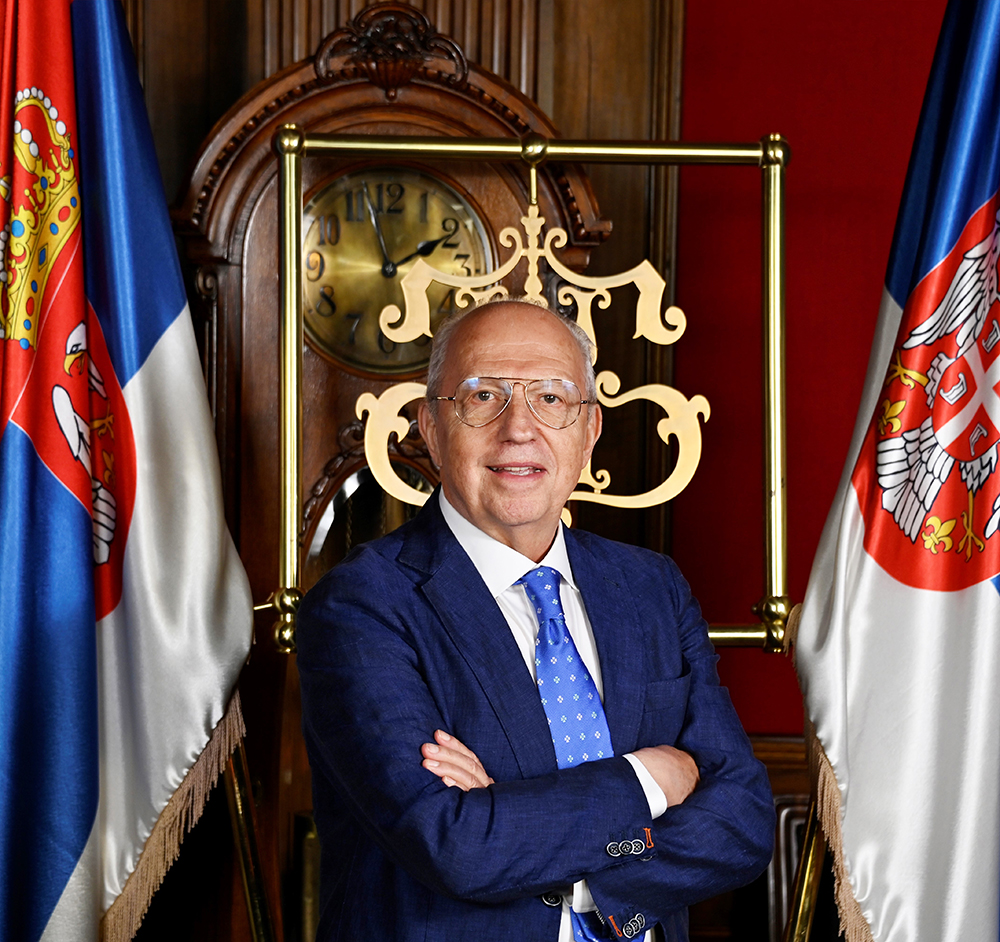
Third term in office – from 19 March 2025
Second term in office, 5 years – from 22 March 2018 to 22 March 2023
First term in office, 5 years – from 13 November 2012 to 13 November 2017
Nebojša Savić was born in 1951 in Belgrade. He finished grammar school in Belgrade, and graduated from the Belgrade Faculty of Economics (1974), where he earned his MSc (1976) and PhD (1981) degrees. Since 2003, he has taught as a full-time professor at FEFA – the Faculty of Economics, Finance and Administration in Belgrade. He was a dean of FEFA from 2003 to 2009. Between 2007 and 2024, he was an affiliated professor of microeconomics at the Institute for Strategy and Competitiveness, Harvard Business School, Harvard University.
He participated in specialised programmes at the US National Bureau of Economic Research (NBER) and Harvard Business School, Harvard University.
His experience in economic policy management, macroeconomic and stabilisation policies, transition to the market economy, structural adjustment, enterprise restructuring and building institutions of the market economy spans several decades.
Prof. Savić was a member of the Board of Directors of Alfa Banka Serbia (2006–2012), member and president of the Board of Directors of Komercijalna Banka (2003–2005), and member and president of the Supervisory Board of Komercijalna Banka (1998–2003).
He served as director of economic research at the Economics Institute in Belgrade and editor-in-chief of the Economic Barometer. As a member of the economic team led by governor Dr Dragoslav Avramović, he took part in the monetary reform and introduction of the new dinar (1993–1995).
He was a member of the Serbian Government’s National Competitiveness Council from 2008 to 2012.
He has authored a number of books and over 50 papers in domestic and foreign publications. He was president of the Yugoslav Economic Association and is now a member of the Presidency of the Serbian Economists Association. He has also participated at World Congresses of the International Economic Association with his scientific papers.
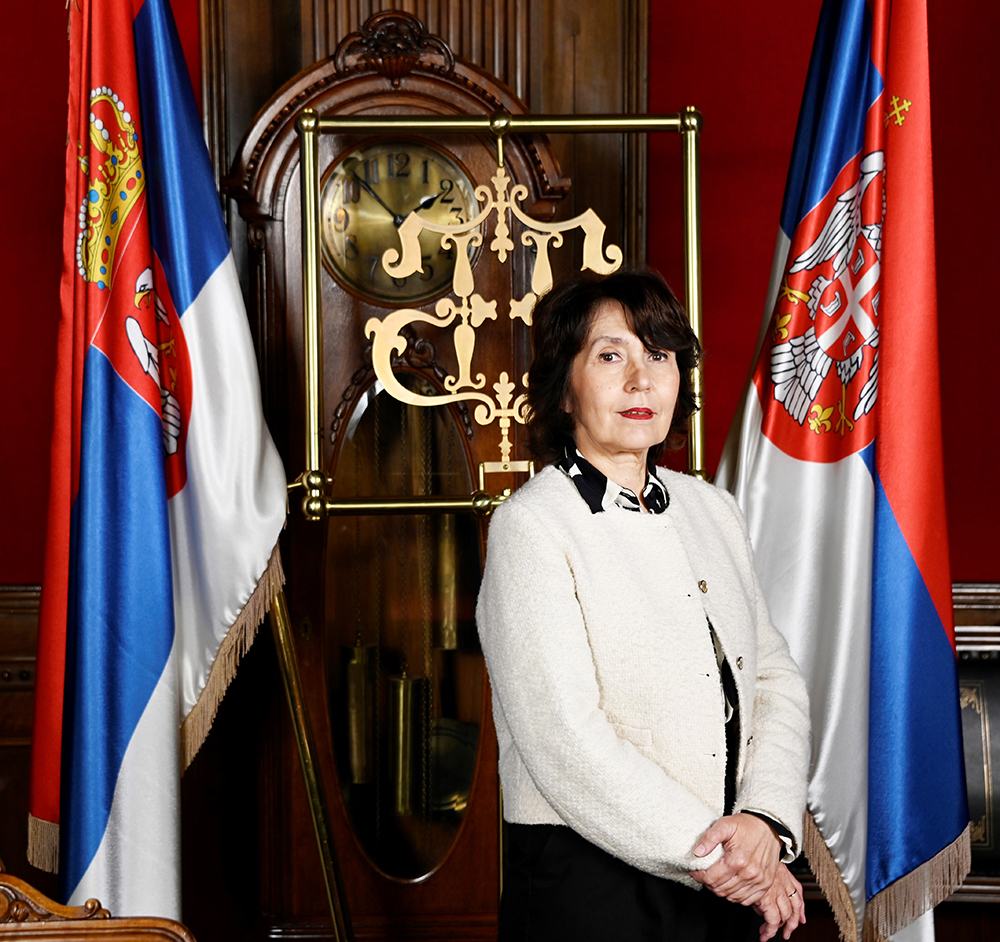
First term in office – from 19 March 2025
Ana Jovanović was born in 1961 in Niš, where she finished primary school and grammar school. In 1984 she graduated from the Faculty of Law in Niš, where she also received her Master’s degree in finance and financial law (2001). She obtained her PhD in 2006 at the Faculty of Business Studies in Belgrade by defending her doctoral thesis in the field of public finance.
Her professional career includes various positions, primarily in finance, banking and capital market, and her professional experience includes positions at Investbanka a.d. Belgrade (1985–1994) and in legal practice (1994–2001). She held academic positions at Megatrend University and Union University Nikola Tesla, where she taught courses in monetary and public finance, financial markets, and financial management. In 2013, she served as a research fellow in economics at the Jovan Cvijić Institute of the Serbian Academy of Sciences and Arts. Since December 2013, she has been Director of the Central Securities Depository and Clearing House a.d. Belgrade.
During her professional career, she passed several professional examinations, and attended and completed various courses and specialisations, the most significant being: the banking examination (Association of Banking Organisations, 1987), the judicial examination (Republican Secretariat for Justice and Administration, 1988), the innovation course “Banking Operations” (Faculty of Economics in Niš, 1990), and an international banking specialisation at Barclays Bank in London and Anglo Yugoslav Bank in London (1991).
As a financial expert and senior consultant, she was engaged in international projects of the United Nations Development Programme (UNDP), primarily on regulatory reform and harmonisation of Serbian legislation with the EU acquis: “Support to the Ministry of Finance of the Republic of Serbia” (2006–2008), “Development of the Free Legal Aid System in the Republic of Serbia” (Ministry of Justice, 2009), “Working Framework for Coordination of Financial Sector Policies” (Ministry of Finance, 2010). She also participated in projects of the Ministry of Science.
She has authored a number of scientific papers in the area of finance, published in notable foreign and domestic journals, as well as monographs on public finance.
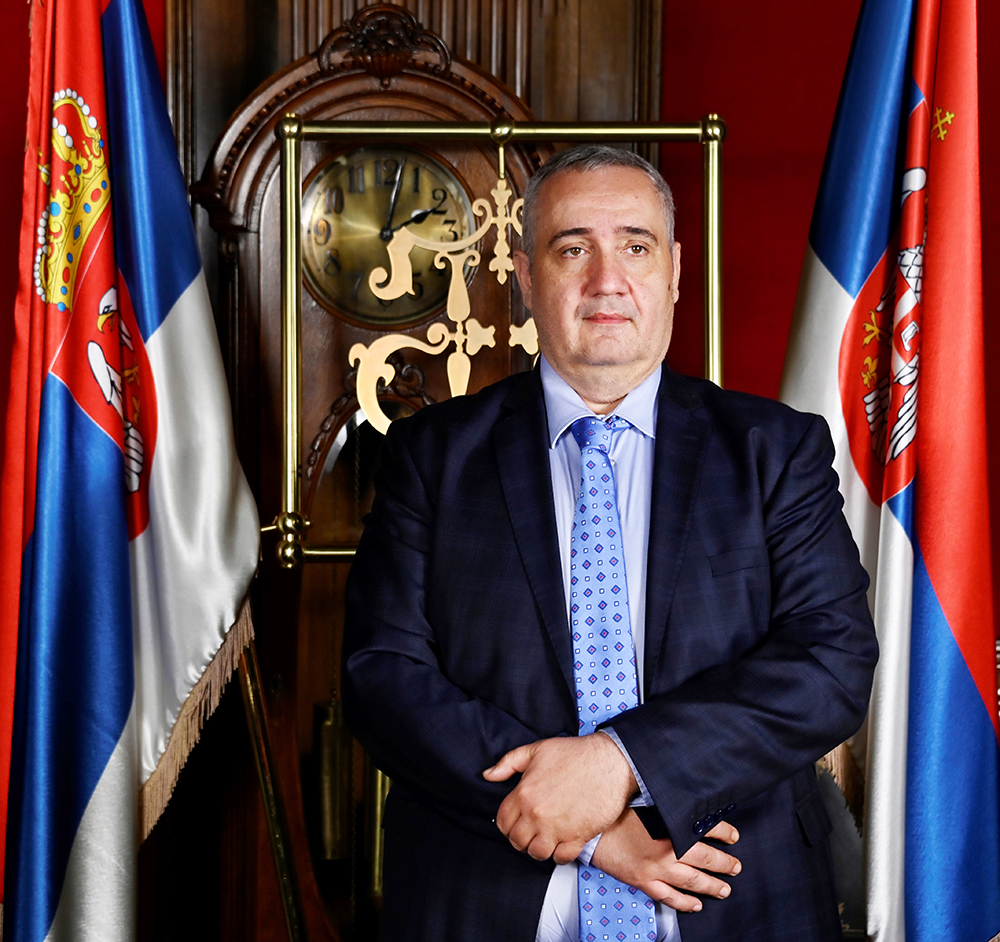
First term in office – from 19 March 2025
Boško Vidaković was born in 1976 in Belgrade, where he completed primary school and grammar school. He has graduated from the Faculty of Law, University of Belgrade.
He has been employed at the Chamber of Authorised Auditors since its establishment and has served as the Secretary General of the Chamber of Authorised Auditors from 2009 to the present. His tasks include managing the Chamber, representing and acting on its behalf. He participates in the implementation of examination programs for obtaining the title of an authorised auditor and their organisation, as well as in carrying out continuous professional development programs for authorised auditors. He represents the Chamber of Authorised Auditors at meetings of the National Accounting Commission.
Since 2020, he has been a member of the Public Audit Oversight Board that provides expert assistance to the Securities Commission in implementing the provisions of the Audit Law, particularly in the supervision of audit firms and authorised auditors.
Additionally, he possesses significant expertise and experience in the financial sector, having previously held positions in the supervisory bodies of domestic financial institutions.
He has participated in numerous domestic and international projects aimed at advancing and developing the auditing profession in Serbia. Of particular importance is his involvement in the REPARIS program (Regional Program for Accounting and Auditing Reform in the Western Balkans) of the Financial Reporting Centre, which contributed to the improvement of auditing and accounting standards in Serbia. He has also actively participated in enhancing the effectiveness of the AML/CFT/CFP system.
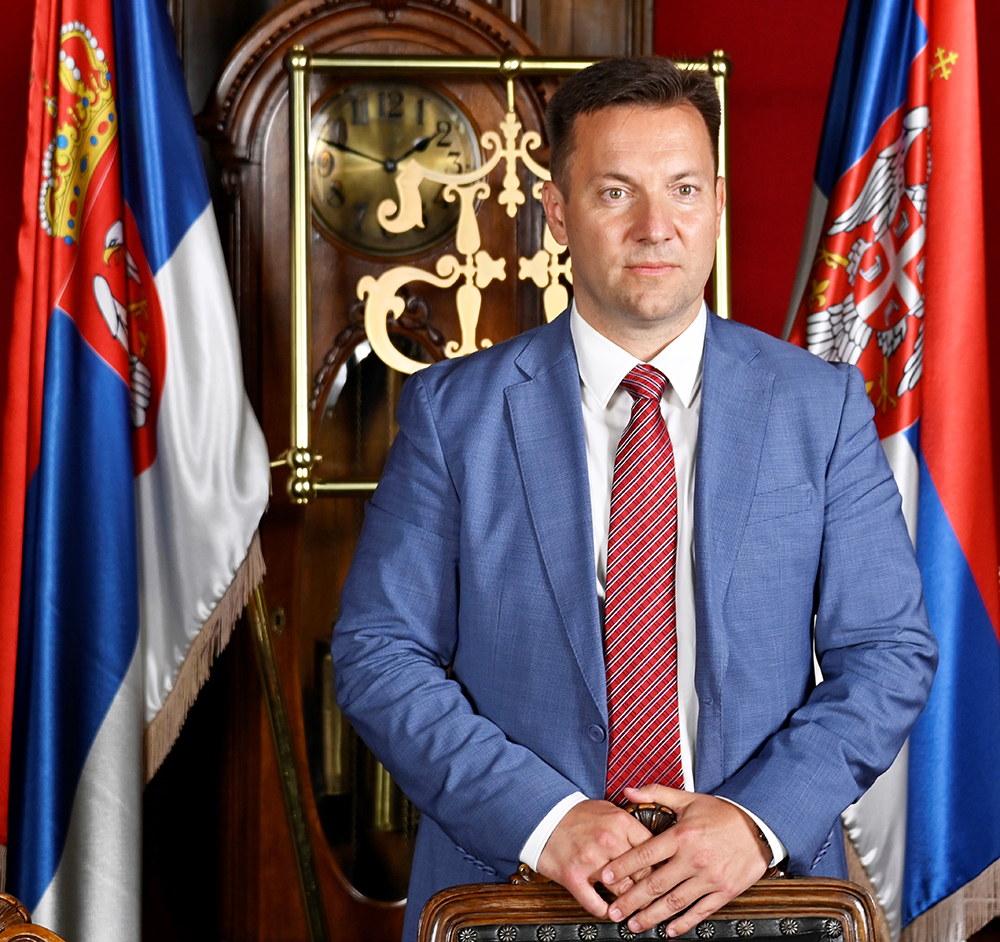
First term in office – from 19 March 2025
Dr Nikola Gradojević was born on 5 June 1970 in Novi Sad where he finished the primary school “Đorđe Natošević” and grammar school “J. J. Zmaj.” He earned his BSc and MSc in electrical engineering from the Faculty of Technical Sciences, University of Novi Sad in 1996. He obtained his Master’s degree in economics from the University of Essex and Central European University in 1998, followed by a PhD in financial economics from the University of British Columbia, Vancouver, in 2003.
During his academic career spanning over 20 years, he has worked as a professor in the field of business finance at numerous universities worldwide: in Canada (University of Guelph, 2015–present), in France (IESEG School of Management, 2012–present), in England (University of Essex, 2014–2019), and in Italy (University of Bologna, visiting professor, 2013–present), as well as at the Bank of Canada (2000) and the Federal Reserve (US central bank, 2007). In addition to the above, Dr Gradojević is currently engaged as a senior fellow at the Rimini Centre for Economic Analysis in Italy, as an advisor at the Research and Development Institute for Artificial Intelligence of Serbia, and at the Centre for Advancing Responsible and Ethical Artificial Intelligence (CARE-AI) in Canada. He also serves as a full professor in business finance at FIMEK (Faculty of Economics and Engineering Management) and FTN (Faculty of Technical Sciences) in Novi Sad.
Dr Gradojević is the author of numerous scientific papers in the fields of investment management, artificial intelligence, international finance, securities valuation, financial risk management, and the application of engineering methods in finance and economics. His first invention was registered as an international patent “System and method for artificial intelligence and machine learning model validation” (with David Van Bruwaene and Stuart Maiden), published on 30 March 2023, under the International Publication Number WO/2023/044555A1. The second patent, “System and method for fuzzy logic based model risk management” (with David Van Bruwaene), was published on 26 October 2023, under the International Publication Number WO/2023/201441A1. In addition to his active inventive work, Dr Gradojević also serves as an associate editor for the Canadian Journal of Administrative Sciences in the field of finance.
Dr Gradojević’s ORCID researcher number is 0000-0003-4001-3159.
He is married, with two children.